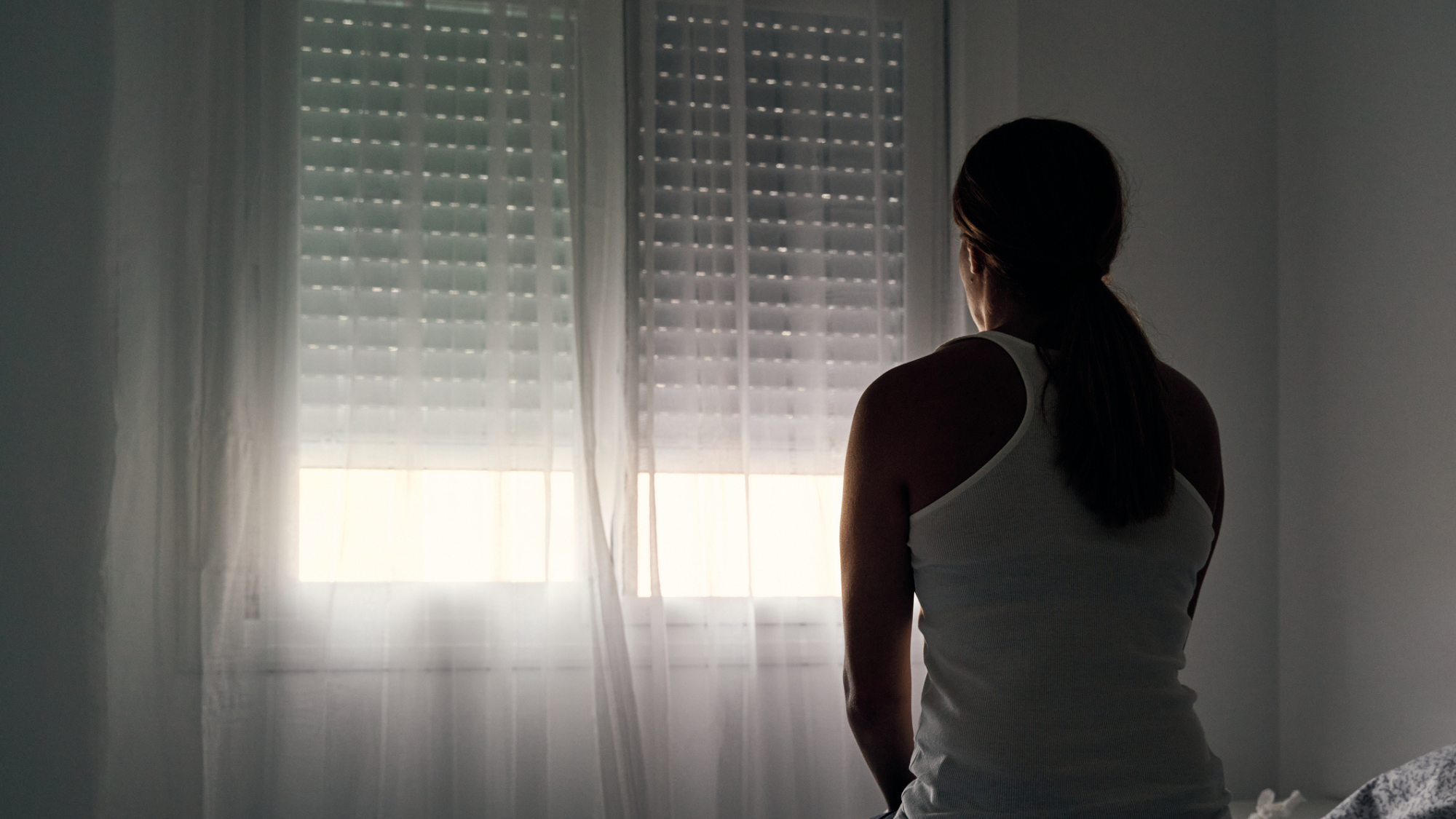“Menopause gave me anxiety – how I took charge and reclaimed my mental health”
Why do so many women struggle with their mental health during menopause? And what can you do if you’re feeling low?


Did you know that women are twice as likely as men to develop clinical depression or anxiety, and this is usually related to hormonal changes? Yes, that’s right, hormones have a direct impact on our moods and emotions thanks to our menstrual cycles, the types of contraception we may take, hormonal changes in pregnancy, and of course, the perimenopause and menopause.
It goes without saying that feeling sad, upset or worried is part of being human (and totally normal), but during the perimenopause and menopause the definition of what’s ‘normal’ can change (thanks to our fluctuating hormones).
According to research conducted by Livi in April 2022, where 2,000 women in the UK were polled about their personal health experiences, perimenopause or menopause is currently women’s second biggest health concern (28%) following mental health (31%) – and these two often come hand in hand.
To better understand the link between menopause and mental health we caught up with two female health experts: Dr Victoria Manning, GP and advisor to the new menopause platform Issviva, where women can learn and share information about their menopause experience, and Dr Bryony Henderson, lead GP at Livi, the digital healthcare provider – who recently launched the Uneducated series exploring women’s health.
Drawing on expert insight, they share everything you need to know about the menopause and its impact on our mental health – plus, their top coping tips.
How do perimenopause and menopause impact our mental health?
“During peri-menopause, our ovaries naturally produce lower levels of hormones including oestrogen, progesterone and testosterone to name a few,” explains Dr Manning.
“Reduced oestrogen for example,” adds Dr Henderson, “can affect your mood because of its impact on the levels of serotonin in your brain. Serotonin is a hormone that stabilises your mood and promotes happiness and wellbeing. When the levels of oestrogen go down, so do the levels of serotonin, which explains why you might feel closer to tears, a bit low or even depressed.”
Celebrity news, beauty, fashion advice, and fascinating features, delivered straight to your inbox!
A post shared by Let’s All Talk Menopause (@letsalltalk.menopause)
A photo posted by on
These changing hormone levels can have a direct impact on your mental health, says Dr Manning. “It’s also worth noting that If you have a history of mental health issues, then you’re more likely to be depressed during menopause.”
And on top of the impact of hormonal changes, many women find that the physical symptoms of menopause have a negative impact on their mood, too. “It’s tough to walk around worrying about sudden hot flushes, to not getting the sleep you need, being unable to enjoy sex to the same extent and to get used to a new weight, for instance,” says Dr Henderson.
What mental health problems are most common in perimenopause and menopause?
Low mood and even depression are common symptoms of the menopause and they can impact you at any time, says Dr Manning, “anxiety, low mood, mood swings are all common symptoms during this phase. It’s normal to feel irritable and have less patience with family and friends”.
Women often report feeling invisible to society, she adds, “and sometimes they even feel a sense of loss. These are all quite normal feelings but don’t be afraid to tell people how you’re feeling. There’s nothing to be ashamed of.”
The difficulties can be quite pronounced, says Dr Henderson, “and often seem to appear out of the blue, which can make them more difficult to deal with”.
A post shared by Finestripe (@finestripeproductions)
A photo posted by on
How many women experience some sort of mental health impact during menopause?
Research shows that 69% of women say they experience difficulties with anxiety or depression due to menopause.
“Mental health difficulties during perimenopause and menopause are so widespread that some researchers have proposed a new term to describe them: ‘menopause distress’. The symptoms are described as significant and persistent, yet different enough to other depressive diagnoses to warrant their own label,” says Dr Henderson.
“Over the years of working as a GP and now aesthetics doctor, so many women have come to me with mental health symptoms which may or may not be a result of reaching the menopause,” adds Dr Manning. “Menopause symptoms can affect their whole life and it can have a huge strain on their mental health in particular. Relationships are often impacted and sometimes they experience problems at work too.”
When are you more likely to experience depressive disorders during menopause?
You are 2-5 times more likely to experience depressive disorders during perimenopause than during the late premenopausal years, says Dr Henderson. “For some, emotional exhaustion can make everyday tasks difficult.”
Midlife is also a time when many of us go through life-changing experiences and events, she adds. “Life stressors and adversity can contribute to mental health difficulties, which is why some types of therapy can help.”
“Often we find that women who have never experienced low mood before, start to feel incredibly low and that can be scary and confusing,” says Dr Manning. “Around 25% of menopausal women consider changing jobs or leaving work at this time. We all need to be acknowledging this is a huge waste and employers need to offer much more support for their menopausal workforce.”
“Menopause gave me anxiety for the first time in my life”

Louise*, 50, has been prone to anxiety throughout her life, but started to feel a new and different kind of ‘low’ around the age of 45. “I felt very anxious in situations where previously I had felt fine – busy shops, walking the dog, using public transport,” she says.
“I saw my GP after about a year as I was really struggling, and he prescribed anti-depressants. I had never been on anti-depressants before and I started using a low dose – 50mg Sertraline – which definitely took the edge off for a few months, but my gut feeling was I knew it wasn’t the right treatment, so I weaned myself off them.
“Through googling, I realised my symptoms were most probably due to major shifting hormone levels, so I sought out a private Menopause Specialist ANP (Advanced Nurse Practitioner) who had a clinic thankfully near to where I lived. After an initial discussion I started on an oestrogen supplement and my mood changed over time. Once again, and only based on a gut feeling, the mood shift felt more natural as I felt more back to myself rather than an anti-depressant which felt like it was masking my mood.”
Louise’s anxiety made her feel very insecure about her relationships with family, friends and work colleagues. “In my low moments, I would question if I bought anything positive to any relationship. I’ve also read how many women feel they lose their confidence during the peri/menopause and I can resonate with that around my close relationships,” she says.
“I felt (and feel!) very impatient with my teenage children and often just wanted to be away from them – this has got better with HRT and exercise but I still feel they can trigger my emotions very quickly,” she adds. “My husband is wonderful and very understanding – we’ve talked a lot about the symptoms and their impact, however it’s without a doubt put a huge strain on us. I’ve been grumpy, resentful and my libido has essentially crashed. I just don’t want to be touched. My ANP prescribed me a testosterone gel to help and initially it worked for a few months but sadly, I’ve gone back to having a very low libido. I really worry about this and the impact on our marriage.”
But it’s not all doom and gloom – a combination of HRT and exercise has helped Louise to reclaim her mental health. “The HRT has definitely helped but I would say the biggest, positive contributor is exercise. I now do three gym sessions a week (HITT class, yoga and 30-minute swim), plus I walk the dog 4-5 time a week. For me, this really helps. I also drink less caffeine and alcohol and eat less sugar – but I’d never give them up completely, treats are crucial. I also make sure I spend minimum one evening a week with girlfriends.”
Of course, HRT – while great for many women – isn’t for everyone. Suzanne Boudier, 49, felt so low, she decided to develop her own supplement to help tackle menopause symptoms. “I’ve never experienced anxiety before and suddenly felt it in abundance,” she says. “Every noise made me jump, I didn’t want to drive our teenage kids anywhere as the thought of driving filled me with dread. Lash on depression, night sweats, weight gain, bloating, low energy, brittle hair, ageing skin… it was an unbearable existence. In all honesty, I was one of the one in four women who felt they simply couldn’t cope. If rock bottom had a basement, I got into a very dark and overwhelming place.”
Suzanne, like Louise, went to her GP and had hormone level blood tests which came back negative. “I felt left to my own devices,” she says. “I went privately for help and tried bio-identicals but they didn’t do anything for me.”
How did she reclaim her mental health? Diet, exercise, supplements and mediation. “Meditation was a big help with anxiety and also playing all my favourite 80s songs and music that really resonates with my soul – which sounds absolutely mad,” she says. “But listening to music or even watching films that feel familiar, safe and have some joyful associations, really helps lift mood too. I forced myself to go to concerts so I could lose myself in some of my favourite artists and took trips to the Kent coastline, as there’s nothing like a trip to the beach, rain or shine.”
“Menopause,” Suzanna says, “is really about throwing away any rule book and doing things your way, whatever works then do that. It forces you to go inwards, it makes you look at your life. Nap, sing, walk, swim, chat utter twoddle with a girlfriend, hang out in the garden with a book, try to focus on all the small joyful moments that each day brings, laughing with my daughters and keeping in mind that this is a rite of passage to a life without a menstrual cycle – I mean, how liberating is that.”
What should you do if you’re struggling with your mental health during menopause?
A post shared by Dr Naomi Potter | Menopause Doctor | Formerly @drmenopausecare (@dr_naomipotter)
A photo posted by on
1. Book a GP appointment
Your first port of call should be your GP to explain how you’re feeling. “I know first-hand that so many women are fearful of going to their GP to discuss menopause symptoms and they often question whether it is something that's worthy of an appointment. If it bothers you, it’s worthy of a GP appointment,” says Dr Manning.
“Make sure you ask if there is a doctor or a nurse that specialises in menopause,” she adds. “If there is, then they'll likely have had some additional training and they should be up to date in terms of guidelines and treatments.”
Dr Henderson reiterates this: “Please do reach out to a doctor if your symptoms are impacting your mental health and remember you are not alone. Depressive symptoms are very common during perimenopause and menopause, and a doctor will be able to guide you through your options, including talking therapy, antidepressants, HRT or a combination.”
2. Log your symptoms
The best way to prepare yourself is to gather as much information as you can. “Read up about perimenopause so that you’re able to identify symptoms and know what to expect,” says Dr Henderson.
“The GP is probably going to ask you lots of questions and will want you to provide quite a bit of detail,” says Dr Manning. “The GP will want to know about your symptoms, how long they've been going on, how they’ve changed over time, and if they fluctuate.” Dr Manning suggests keeping a journal or diary so you can note how often you’re feeling low and see if there is a pattern developing.
3. Talk to friends and family
“Tell family and friends how you’re feeling – they can be a huge support during tough times,” says Dr Henderson.
“Just chatting with other people and hearing their thoughts tends to validate what you're going through and makes you feel less anxious,” adds Dr Manning. “I find with my patients that when they understand what they’re going through and they feel well-informed and ‘heard’ they tend to manage their menopause experience in a much more positive light. Understanding they are not alone or going crazy is important and there are some brilliant support groups out there, like Issviva which is a free website where you can learn about menopause and share your experience with others in a closed group environment. Talking and sharing is beneficial to your whole menopause journey.”
4. Consider HRT
“Depending on your circumstances, your GP might prescribe HRT,” says Dr Manning. “My suggestion would be to try it for three months and if your mood improves, then great. However, if HRT doesn't make a difference, it might be a case of going back to the drawing board and actually digging down a bit deeper. The cause of this mood dip could be clinical depression so I would suggest trying an antidepressant for a few months. Again, if it doesn't work, you can eliminate it. Medicine is never as clear and simple as it requires a bit of investigative work.”
A post shared by Dr Louise Newson (@menopause_doctor)
A photo posted by on
5. Move your body
“Stay healthy, this includes eating a well-balanced diet and regular exercise. Research shows that physical activity has a positive effect on both physical and mental health during perimenopause. It also releases endorphins and other feel-good hormones,” says Dr Henderson.
“Whatever stage of the menopause you’re at, exercise is undoubtedly beneficial,” says Dr Manning. “As your metabolism slows, many women report weight gain, so cardiovascular activity will help manage this. If you haven’t exercised for a while, I recommend starting with at least ten minutes a day of brisk walking (ensure your heart rate increases and you become slightly out of breath) and then introduce some strength training. This often helps you reduce body fat, strengthen your muscles and burn calories more efficiently. If you can exercise outdoors, do so, as this is proven to help improve your mood and help boost energy levels.”
If you’re worried about your mental health during this time of change, book an appointment to speak to a doctor.
*name changed
-
 I Fell Hook, Line and Sinker For The Hormone Imbalance Trend - But It Taught Me That Women Are Still Being Served A "One-Size-Fits-All"
I Fell Hook, Line and Sinker For The Hormone Imbalance Trend - But It Taught Me That Women Are Still Being Served A "One-Size-Fits-All"How health TikTok capitalised on my confusion - and what I learned instead.
-
 She's Renowned For Her Nutritious, Mood-Boosting Meals - 19 Dr Hazel Wallace Recipes You'll Make On Repeat
She's Renowned For Her Nutritious, Mood-Boosting Meals - 19 Dr Hazel Wallace Recipes You'll Make On RepeatHer latest book, Not Just A Period, is one you'll wish you had growing up and that you'll want all your friends to read.
-
 Balancing Your Hormones Has Gone Wildly Viral This Year – but Are Some of the Hacks Actually Harmful? Top Nutritionists Debunk
Balancing Your Hormones Has Gone Wildly Viral This Year – but Are Some of the Hacks Actually Harmful? Top Nutritionists DebunkFeeling overwhelmed by all the noise around hormone balancing?
-
 How learning more about your hormones will change your life
How learning more about your hormones will change your lifeIn partnership with Vichy
-
 How to utilise the power of your period and sync your skincare routine to your cycle
How to utilise the power of your period and sync your skincare routine to your cycleIn partnership with Vichy
-
 The ultimate menopausal skincare routine, according to a dermatologist
The ultimate menopausal skincare routine, according to a dermatologistIn partnership with Vichy
-
 3 need-to-knows about your hormones we bet you didn't know
3 need-to-knows about your hormones we bet you didn't knowIn partnership with Vichy
-
 Menopause symptoms vary from person to person – here, three women share their own experiences
Menopause symptoms vary from person to person – here, three women share their own experiencesMenopause isn’t one size fits all.



